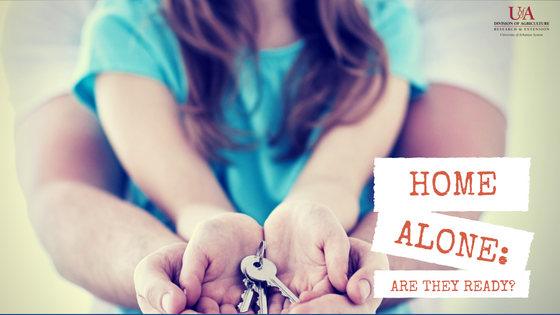Home Alone: Are They Ready?

One of the hallmarks of growing up is becoming more independent. Parents may find it difficult to let go, but it is very important to allow children to gain skills that will help them be successful adults. One of they ways children can show their independence is by staying home alone. During the summer or other times kids are out of school, childcare may be an issue. You may have plans for camps or for grandparents to watch your child; however, sometimes other arrangements may be needed. If you have an older child, you may be wondering if they are ready to stay home alone. Because every child is different, there are no hard and fast rules regarding what age is appropriate to leave a child home alone (though some states have laws regarding this issue); however, there are several things to take into account when making the decision to trust your child with this responsibility.
Legal Status
Arkansas does not have a legal limit on what age a child may be left home alone. Some school districts have rules about what age they will allow a child to get off the bus at home without an adult present (for many, that age is 9 years old or older), and that may be a good guideline for your family. Although there is no state regulation on a safe age to leave a child alone, an infant or toddler should never be left at home alone, even for a brief time. Many child welfare experts suggest age 12 as a minimum, safe age for being left for more than an hour or so, while children 9 - 12 may be alone for an hour or less. It is up to the local police whether or not to file charges should a call be made while a child is home alone. Additionally, there are no regulations about leaving children in charge of siblings or others; however, it is not advised that an infant or toddler be left in the care of a sibling under the age of 13.
Age and Maturity
When assessing whether your child is ready to stay home alone, their age is certainly a consideration; however, every child is different. Some 8-year-olds are far more mature and capable than some 15-year-olds. Several things to ask yourself when making this important decision are:
- How long do you plan to leave your child alone? And at what time of day?
- Are there neighbors nearby who could be called on in an emergency?
- Is your child comfortable with staying home alone?
- Can your child read well enough to follow instructions?
- Can your child open and close windows, lock and unlock doors, and operate small appliances (toaster, microwave)?
- Can your child reliably use the telephone, and do you have one available for them to use (either landline, cell, or tablet)?
- Does your child have the maturity to behave calmly in a crisis?
- Does your child understand plans for emergencies such as fire or storms?
- Would your child reliably follow house rules such as staying inside or in the yard, not answering the door or divulging to a stranger that s/he is home alone, staying away from dangerous things in the house such as chemicals and firearms, and responsibly using the internet?
If you or your child are not comfortable with these issues, they are probably not ready to stay home alone. If you want to begin preparing them to stay home alone in the future, these are good guidelines to keep in mind.
Talk to Your Child
Is your child excited about or even ok with staying home alone? If she or he is afraid, it may have an impact on decision-making now or comfort with being home alone in the future. Be sure to discuss the idea with your child and be open to their concerns and ideas. Having a trial run where you leave the child for a very brief time is a good idea. Maybe leave and walk around the block or go to the corner store. If they are calm and collected, they will likely be fine for a longer period. Keep in mind, "a longer period" may be 30 minutes to an hour, or it may be several hours depending on your child's maturity, age, and comfort level. In general, children under age 12 will find staying home all day very difficult to manage, and it is not suggested that younger children be left alone for longer than an hour or so. Children are far more likely to get into trouble the longer they are alone due to boredom or curiosity. It is very important to set boundaries and expectations with your child regardless of age.
Ask your child what she or he would do in emergencies. Fire? Knock on the door? Storm? Injury? How would they handle these situations? Be willing to role play different scenarios with your child to give them practice and confidence. This will be helpful beyond staying home alone.
If you decide that your child is ready to stay home alone, don't overdo it. Be sure to limit the time they are on their own, especially if they are young. Teens can typically do just fine even if left home all day; however, children under 12 or 13 will need balance with other activities and other kids.
For More Information:
http://www.webmd.com/parenting/home-alone-or-watching-younger-siblings
http://katv.com/archive/home-alone-what-age-is-safe-for-children
Child Welfare Information Gateway. (2013). Leaving your child home alone. Washington, DC: U.S. Department of Health and Human Services, Children’s Bureau. https://www.childwelfare.gov/pubpdfs/homealone.pdf
http://www.preventchildabuse.org/images/docs/homealonechildtips.pdf
Related Blogs
Dealing with Emergencies when home alone (Home Alone Part 2)